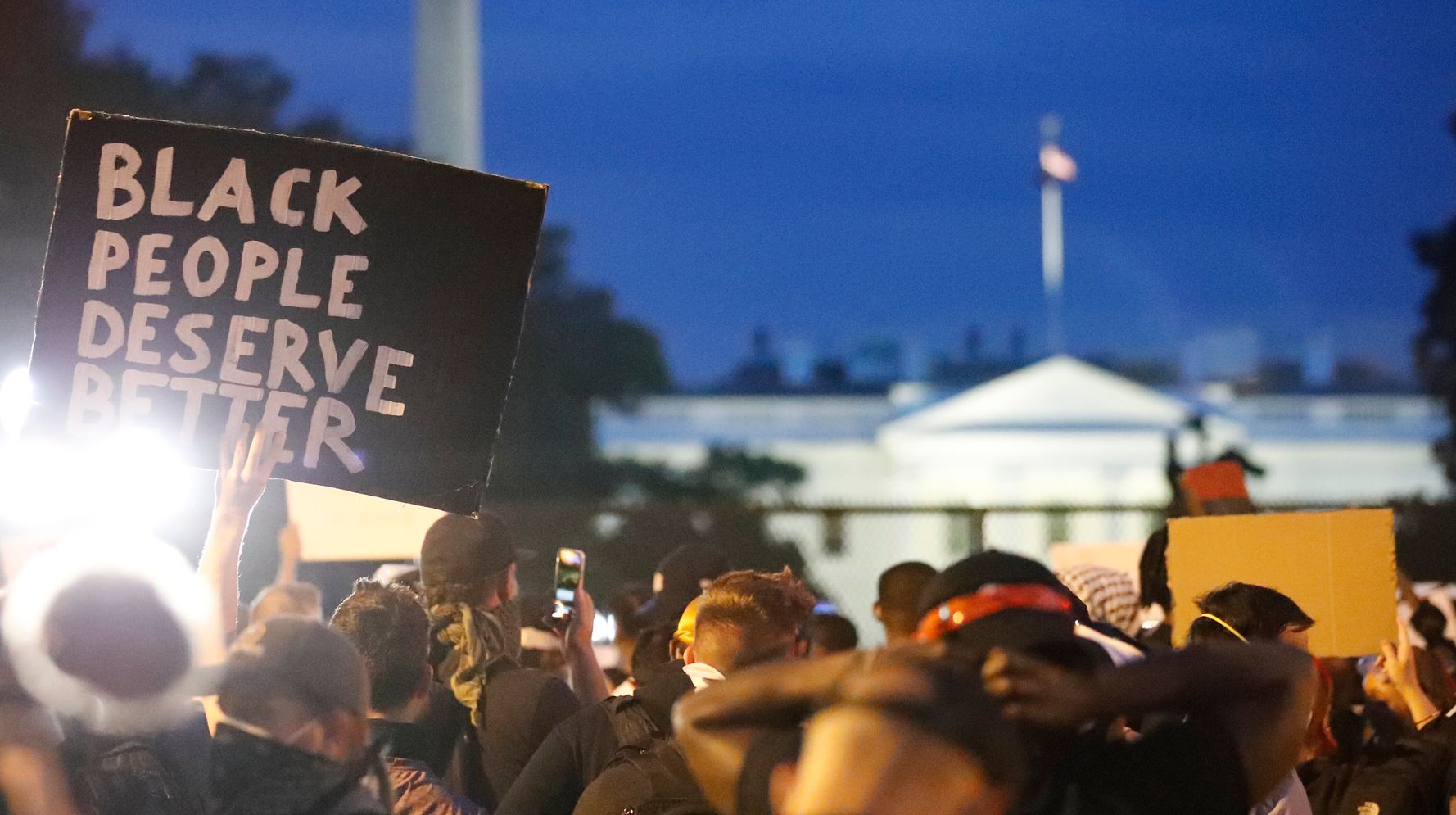[ad_1]
WASHINGTON, D.C. ― With the country in crisis over the police killing of George Floyd, Joe Biden’s remarks about the incident at a historically Black church in Wilmington, Delaware, on Monday, weren’t what protesters wanted to hear.
“Instead of standing there and teaching a cop, when there’s an unarmed person coming at them with a knife or something ― you shoot them in the leg instead of in the heart, is a very different thing,” Biden said, aiming to show empathy and paint a stark contrast with President Donald Trump. “There’s a lot of different things that could change.”
The comment sparked anger among the most progressive activists demonstrating on the streets. As Black Lives Matter protesters and their allies call for defunding the police, ending racist law enforcement practices and holding police accountable at a federal level, the remark by the presumptive Democratic presidential nominee reverberated among young progressive activists as yet another politician falling short.
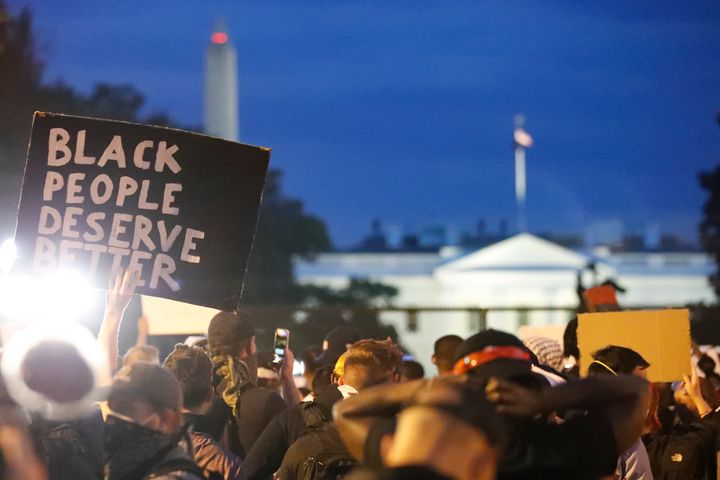
Sunrise Movement, a youth-led climate action group that has yet to endorse Biden, associated his comment with Trump’s call to shoot looters in a Monday post. “That’s the best you can do?” the group tweeted. “You need to be a lot fucking better, and fast (or step aside).”
“His heart is in the right place, but he’s just like every other white person who thinks that they’re an ally but is not listening to people on how to be an ally,” Ashton Woods, a Black Lives Matter protester in Houston who said he’s reluctantly voting for Biden, told HuffPost.
Biden’s campaign and surrogates have defended the former vice president’s response to the crisis. Rep. Lisa Blunt Rochester (D), the first Black person to represent Delaware in Congress, said it was “good to see true leadership that says, ‘I care and I have a plan of action.’” Biden, whose campaign has a Plan for Black America, urged Congress on Tuesday to pass police reform.
The protests sparked by Floyd’s death present yet another opportunity for the Democratic Party to show activists and young Black voters that it is listening to them. So far though, party leaders’ official response has been reactive and redundant. Congress will hold a hearing on police brutality next week, just as it did last year. There’s no firm timeline for legislative action in either the Democratic-controlled House or the Republican-controlled Senate.
“Part of the issue [is] that it’s just been words,” said Rose, 34, who was protesting in Washington, D.C. “We don’t employ any policy changes; we don’t really push the agenda forward. We need more than just words at this point.”
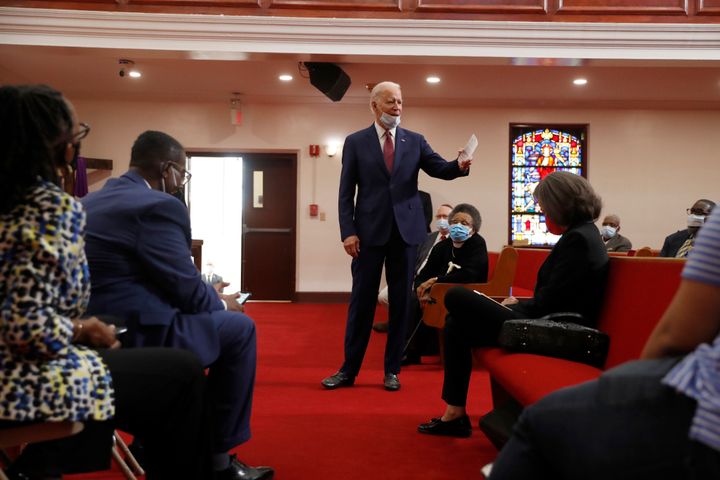
Not Enough Action From Democrats
House Speaker Nancy Pelosi (Calif.) called Floyd’s death a “crime” early on. Democratic leaders have condemned police brutality — just as they did in response to protests in Ferguson, Missouri, six years ago.
But their statements all include the same caveat.
“The small minority who have exploited the protests to wreak havoc and violence are wrong,” Senate Minority Leader Chuck Schumer (N.Y.) said on the Senate floor Tuesday. “They are breaking laws, destroying businesses already struggling to recover, and putting their fellow citizens in danger.”
In New York, Mayor Bill de Blasio (D) called for an investigation after video showed two police SUVs ramming into a crowd of people, but he also blamed protesters for precipitating the situation by “blocking and surrounding a police vehicle.” (The video does not show protesters surrounding the SUVs, and on Monday, amid mounting criticism, de Blasio delivered a more forceful condemnation of police conduct in the incident.)
Others in the party, like former Democratic presidential nominee Hillary Clinton, emphasized the need for voters to express their grievances at the ballot box.
It’s a suggestion that many activists say misses the point of protest.
“I mean, no one has ever voted their way to freedom. You know, voting is important. I vote in every single election. However, we also know that at most, voting someone good into office will soften the ground for the kind of meaningful change that we need. What’s always worked is the protest piece,” said Melina Abdullah, co-founder of Black Lives Matter Los Angeles.
“There is still a huge gap” between what activists are calling for and what Democratic leaders are saying, said Yvette Simpson, chief executive of the progressive political action and grassroots organizing group Democracy for America.
“We only take action when something has happened and that action is generally temporary and changes when political wind changes and when political leadership changes,” Simpson said of the Democratic Party’s response to police brutality, noting that many of these protests are taking place in Democratic-run cities that have long failed to reckon with their problematic policing practices.
We only take action when something has happened and that action is generally temporary and changes when political wind changes and when political leadership changes.
Yvette Simpson, CEO of Democracy for America
On the local level, Seattle Mayor Jenny Durkin (D) came under fire from some progressive city council members for announcing a 5 p.m. curfew on Saturday just minutes before it went into effect. In addition to the police SUVs driving into a crowd, de Blasio has also faced criticism from activists over police arresting two Black state lawmakers on Friday night at a Brooklyn protest and a HuffPost reporter, who identified himself as a journalist, on Saturday night at another demonstration in the borough.
Police violence at the protests, which Simpson said isn’t getting as much attention from Democratic leaders, is “evidence of the fact that these officers aren’t taking this seriously.”
“It’s a shame that you can’t put a hold on police brutality when you are protesting police brutality. … A lot of folks are acknowledging it when it goes to a George Floyd situation but not acknowledging the root of it,” she said.
Congress Searching For Policies To Meet The Moment
Biden locked up the Democratic nomination with the support of a majority of Black voters. But he continued to defend his co-authorship of the controversial 1994 crime bill and never so much as courted many activist groups focused on policing. That approach may not have been enough to hurt his chances in the primary, but it could hamper his ability to turn out the progressive-leaning young people, including young Black voters, that he needs to defeat Trump in November.
“There’s a definite need for him to do a lot more listening,” said Christian Dorsey, a Black progressive activist in Virginia and member of the Arlington County Board.
Biden admitted he needs to do so amid another controversy last month. In an interview with popular Black radio host Charlamagne tha God, he said, “If you have a problem figuring out whether you’re for me or Trump, then you ain’t Black.” Biden apologized later that day in a call with Black business leaders, insisting that he did not take the Black vote for granted.
Mainstream Democrats are keen to emphasize the stark contrast between their party and the GOP, which has embraced Trump’s racist policies and rhetoric.
“While the vocabulary may not always be the same, the long-term goal is exactly the same,” Antjuan Seawright, a South Carolina-based Democratic strategist, said of his party. “Even the differences we have among each other, they do not compare with the differences we have with the other side.”
But in the years leading up to Floyd’s killing, legislation targeting police brutality and racism has barely registered as a priority for congressional Democrats, including in the House, which Democrats have controlled since 2019. Police reform in Congress stalled after Ferguson and then the Trump administration stopped investigating police misconduct at the federal level. In 2018, Congress did pass criminal justice reform legislation under Trump, a significant achievement, but the changes were modest, easing sentencing laws around some federal drug offenses.
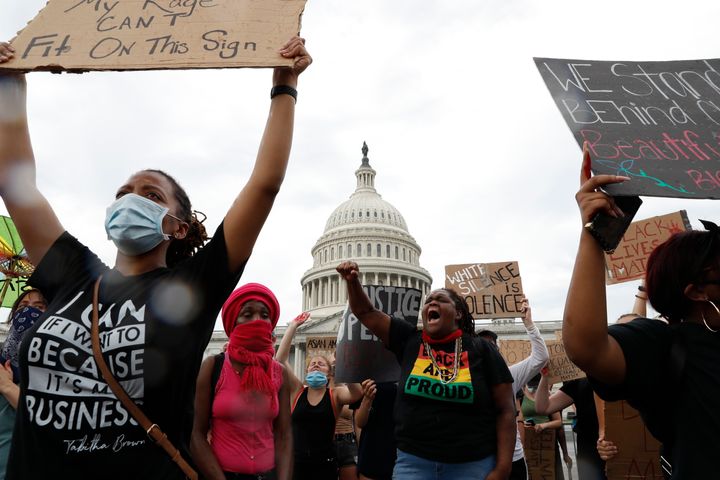
In an interview on ABC News’ “This Week” on Sunday, Pelosi spoke favorably about one bill with teeth ― a federal ban on police chokeholds ― and others that were symbolic, such as the creation of a commission for the study of the “social status” of Black men and boys. And protesters are seeing the same faces behind these messages and ideas.
Ben Baker, a Black 26-year-old activist, said that while a number of Black politicians have spoken out, that’s not good enough.
“I want to see more moderate white politicians speak out,” Baker said. “We can have the left vote as much as they want, but you need people in the middle to take you over the top. Them not saying anything is complicitness.”
As protests continue nationwide, Democrats have begun crafting more ambitious proposals to address police violence. Schumer confirmed that Democratic Sens. Cory Booker (N.J.), Kamala Harris (Calif.) and Tammy Duckworth (Ill.), among others, were working on legislation to implement reforms, from rethinking the qualified immunity doctrine to creating a national police misconduct registry.
Biden’s biggest initial commitment, rolled out at the church in Wilmington on Monday, was likewise relatively vague. He promised to create a police oversight board within his first 100 days in office, though it was not clear exactly what power that panel would have. In a speech in Philadelphia on Tuesday, Biden outlined a number of additional proposals. He called for a federal ban on the chokehold, an end to the military’s transfer of “weapons of war” to police departments, and the creation of a national “model use-of-force standard.”
Many activists at the protests this week said they supported Biden, even if he wasn’t their ideal choice.
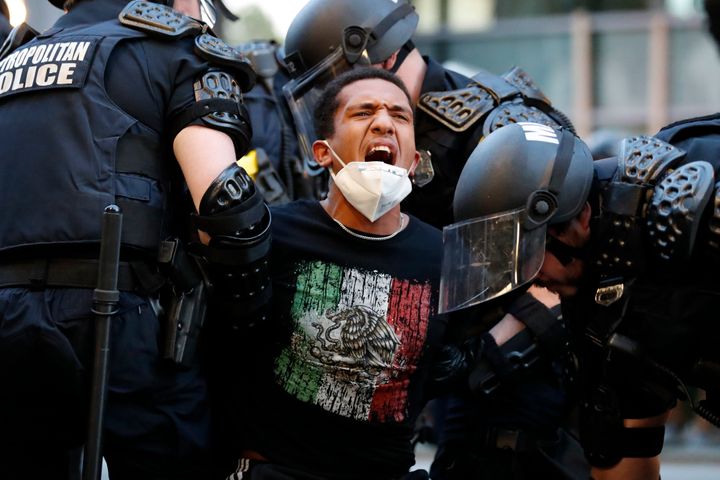
Jackie, 30, who was at the protest outside the White House on Tuesday, said the former vice president “obviously has his flaws, for sure. But at this point, we just need to get behind him.”
“Biden has, in his past, definitely done damage to the Black community, and I feel like he has a lot more making up to do for that, so to come out a little bit more and show a little bit more solidarity, just speak out a little bit more, for sure,” she added.
At the U.S. Capitol building on Monday, a protester who would only identify themselves as T, had another idea for lawmakers: “Congress should get that bullshit ass crime bill out of here — incarcerating us at a mass level. How about we start with some shit like that?”
Biden helped write that legislation in 1994 when he was chairman of the Senate Judiciary Committee. The massive law contained provisions like the Violence Against Women Act that still elicit progressive support, but it also enshrined policies that reformers blame for the growth of a racist incarceration system, such as mandatory prison sentences for certain kinds of offenders and the allocation of massive new federal funding for police and prisons.
The Urgency Of Holding Police Accountable
A significant part of the frustration over Biden’s comment about shooting people in the legs was just how small-bore it was, which is representative of some of the problematic thinking in the Democratic Party.
“It pursues the same trend that other Democratic candidates have had: that we can’t solve the underlying issue, but we can make this common-sense tweak that won’t alienate conservatives,” said Mattias Lehman, a Black resident of Minneapolis and Sunrise’s digital director, who wrote the organization’s pointed tweet.
Symone Sanders, a senior adviser for the Biden campaign, disputed that characterization, taking particular issue with the Sunrise Movement’s association of Biden’s remarks with those of Trump.
“Joe Biden spoke not only to the pain that people across the country are feeling, but specifically to the pain of the protesters,” she said. “So any suggestion that Donald Trump and Joe Biden are two sides of the same coin I just think is incorrect.”
The dust-up over Biden’s latest comment highlights the chasm between an overwhelmingly young and racially diverse array of activists and progressive voters clamoring for radical, immediate change, and a Democratic establishment, now led by Biden, that expresses sympathy for those demands while still playing catch-up on actual policy.
Many of the protesters are thinking much bigger. After all, the Floyd killing didn’t happen in isolation. It came in quick succession after other high-profile shootings of unarmed Black people, including Breonna Taylor and Ahmaud Arbery, as well as the disproportionate impact the coronavirus pandemic is having on the Black community.
Rose, who was at the White House protest on Tuesday, said she wanted to see racism recognized as a public health crisis.
“The confidence is fairly low right now. … It’s hard to have that kind of hope but we have to start somewhere,” she added.
Thereasa, a 33-year-old naval officer and attorney, carried a sign with her list of demands as she protested outside the White House. “All police officers must undergo racial bias testing and pass with an acceptable score, all police homicide cases must be handled by a prosecutor outside of 150 miles from the office from which the case originated, a federal department must be created that is responsible for reevaluating and trying any case involving the killing of a person of color by police officers,” it read in part.
There is increasingly a push on the left to defund the police ― or at least radically decrease the funding for police departments.
“Communities are told there’s not enough money for education, for housing, for health care, for jobs, yet we see ballooning police budgets, over-policing,” said Sochie Nnaemeka, state director of the New York Working Families Party. “The first thing we need is to move money in order to invest in what we need.”
Two civil rights groups in Minneapolis, Reclaim the Block and Black Visions Collective, have put defunding police at the heart of a four-point pledge they are asking city council members to sign. They want the council to promise to never again increase the city’s police budget, to immediately cut $45 million from the existing police budget, to increase investment in “community-led health and safety strategies,” and to do everything it can to “compel” the police and other law enforcement bodies to stop “enacting violence” on protesters and other residents.
I want to see more moderate white politicians speak out. We can have the left vote as much as they want, but you need people in the middle to take you over the top. Them not saying anything is complicitness.
Ben Baker, a 26-year-old activist
The New York Working Families Party’s biggest policing policy push this year is to reduce funding for the police and plow the savings into health care, housing and jobs programs that progressives argue will prevent crime by addressing its underlying causes. It’s not an abstract request: The economic fallout from the COVID-19 pandemic has plunged the city and state of New York into a budgetary squeeze, prompting the city, for example, to cancel its annual summer jobs program for 75,000 low-income teenagers and young adults.
These proposals are unlikely to be adopted by some progressive elected officials, let alone by party leaders like Biden and other mainstream Democrats. In a Tuesday interview, Minnesota Attorney General Keith Ellison, a former progressive congressman well to the left of Biden, rejected the idea of defunding the police.
“There are a lot of police officers who recognize the need for reform and want to be part of it,” he said.
There’s an understanding among progressive Black activist groups that the change they are seeking cannot come overnight. But they’re looking for more from party leaders than what’s been offered for the Black community so far.
“We are still trying to figure out what Biden’s strategy is to energize and activate Black voters,” said Jennifer Edwards, senior director of digital engagement and democracy at Color of Change, a grassroots progressive civil rights advocacy organization. “Not just Biden, but the Democratic Party needs to continue to prioritize the needs of Black voters in this moment. When we think about the bills that are moving through the halls of Congress right now and the policies proposed with respect to COVID and the black community, those can best be described as a bandaid.”
In that context, getting the ear of politicians is a fine place to start, according to Dorsey, the Arlington County Board member.
“The more important thing for me is whether people are going to accept the urgency that activists want,” he said. “That’s the gap that activists are rightly identifying as problematic.”
Jessica Schulberg contributed reporting from Los Angeles.
Calling all HuffPost superfans!
Sign up for membership to become a founding member and help shape HuffPost’s next chapter
[ad_2]
Source link

